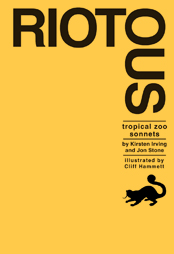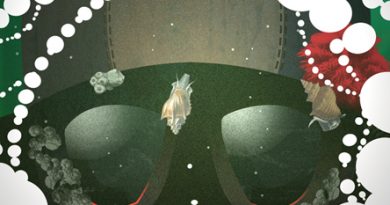Riotous by Kirsten Irving and Jon Stone (poems) and Cliff Hammett (illustrations)
-Reviewed by David Coates–
Riotous is a curiously off-kilter little number, written collaboratively by Sidekick Books editors Kirsten Irving and Jon Stone to promote the Tropical Zoo at Hounslow Urban Farm, a sanctuary for smuggled and abandoned exotic animals. The pamphlet’s twenty-nine sonnets each feature one resident of the zoo, giving some odd and rare creatures their fourteen lines (or so) of fame.
The result is an alert, imaginative and very charming mixed bag. Riotous takes a little while to warm up its empathetic muscles, some of the early pieces feeling a bit exercise-y, allowing the sheer thrill of its descriptive force to muscle out the poems’ broader significance. This particular problem, of course, could be in the subject matter; the pamphlet’s less engaging pieces tend to fall on animals with inexpressive faces (small frogs, salamanders, etc), which leaves their poems riffing creatively and unusually (the ‘Yellow-striped Poison Frog’ is ‘the blueprint for the wrestler’s lycra slip’) on the sheer weirdness of their appearance, and on a very few occasions the poems slightly undermine the collection’s very positive intentions. In representing the animals with such imaginative gusto the poems come close to rendering them once more as exotic curiosities, running very much counter to the book’s remit.
On the other hand, and far more common, are poems like ‘Leopard Tortoise’ (‘now leans her head toward the handkerchief / of green to take it gently in her beak, / as if to comfort every cactus leaf / by carrying it in her gut’) and ‘Chilean Rose Tarantula’ (‘They’ll bury her a hundred times and still / not know if she is watching from the hill’), which deploy a close and precise focus on the literal animal as a point of departure into something very deeply felt. In these and other pieces (‘Red-Bellied Piranha’, ‘Hissing Cockroach’) the reality of the living creature and the meaning-giving function of the poem mesh together more dynamically, and, even more importantly, are a heck of a lot of fun.
On that front there is a great deal to admire, and it’s immediately apparent that for both writers – the book pleasingly gives no indication of who wrote what – these animals provoked a sincere emotional response, and a drive to share their existence with a broader audience. Where this energy works most clearly is in the poems where the poet(s) become(s) part of the action; in ‘Leopard Gecko’, ‘Your flesh is, after all, an ideal soil’; in ‘Two-toed Sloth’, ‘she could still be your conscience, reaching out / to stroke you on the shoulder (“It’s about / the shoplifting”) with warmth and not contempt’; and in one of the collection’s best, ‘Green-wing Macaw’, the animals go full Frost and provide a template for human life:
“The cage is open! Flee! Abscond! Escape!”
They shuffle closer, cluck their tongues, lock bills.
That kid has the scream of a tortured audiotape.
They shuffle closer, cluck their tongues, lock bills.
“Something baleful’s heading from the hills,
its mouth a flagon crammed with flame and hail!”
They shuffle closer, cluck their tongues, lock bills,
blank out the world and its endlessly variable wail.
If all a couple needed was a jut
of tendril-wood laced through a metal mesh,
they might be happy as these two, who’re shut
inside all day but red and full and fresh.
He blows her a kiss with claw and mandibles.
They shuffle closer, cluck their tongues, lock bills.
The sonnet form, though it occasionally – understandably – trips up a poem or two, is negotiated deftly throughout the collection, giving a valuable stability to a book that could easily have run wild on its own premises. The two that do not quite conform are explained away with a dash of wit that would be a shame to spoil here.
Riotous is a pretty and big-hearted object, with its string binding and brash cover, and Cliff Hammett’s detailed illustrations ably complement the poems. The collection’s generosity of spirit makes it less moralising ‘Kipling-esque’ or domineering ‘Ted Hughes-y’ (see the cover blurb), more the witty, all-inclusive school of Elizabeth Bishop. As far as nature poetry is concerned, that’s tough to beat.




